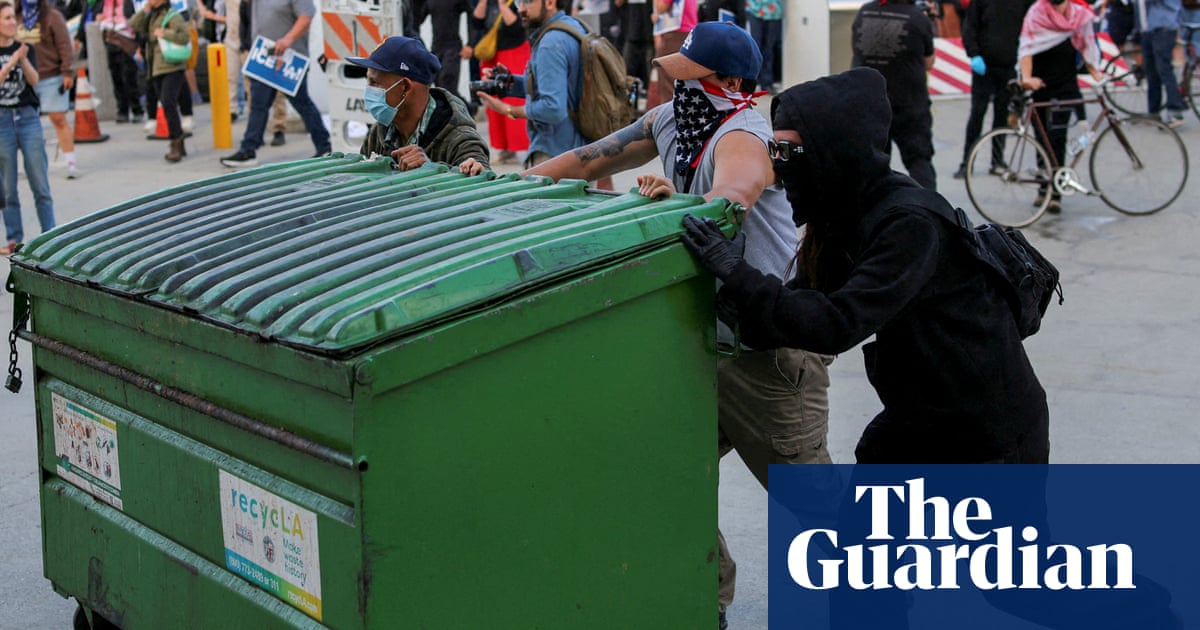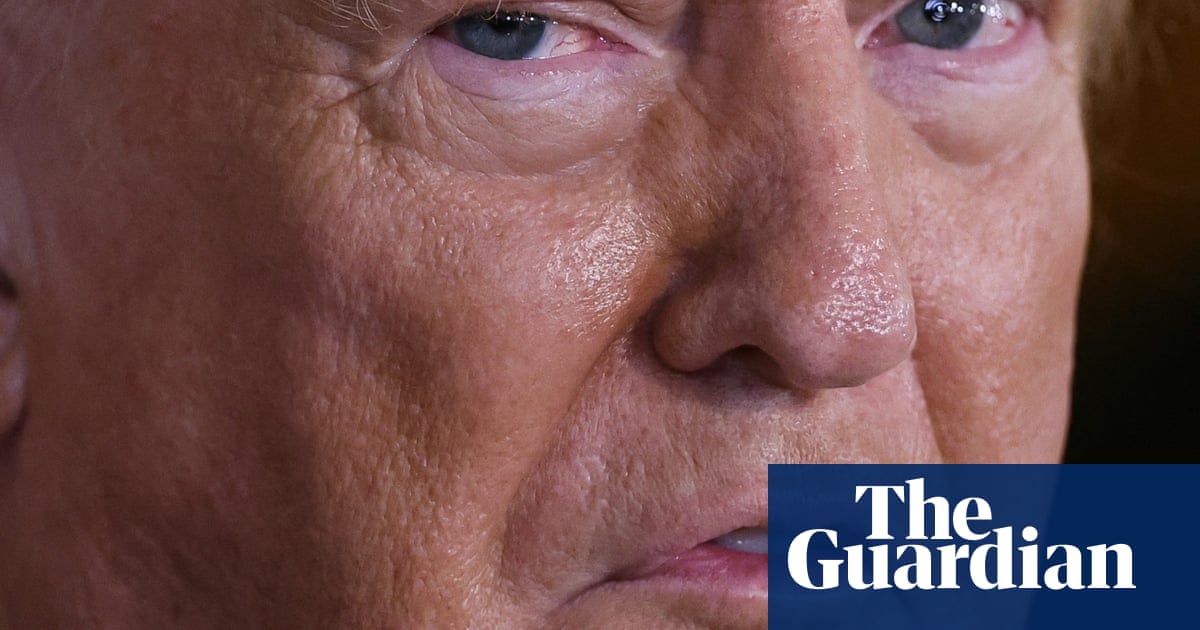David Hogg believes the Democratic party not only needs better messengers – it needs stronger fighters.
“The base of the party, they just want us to do anything,” the 25-year-old Florida activist and Democratic National Committee (DNC) vice-chair said in an interview last week. “They feel alone, they feel isolated, they feel unheard, and they feel like they’re not being fought for.”
Frustrated by what he sees as an entrenched establishment dominated by a culture of “seniority politics”, Hogg is urging Democrats to embrace growing calls for generational change. His pitch is competitive primaries, which he argues are a “healthy” way to inject new energy into a party desperately seeking momentum after last year’s demoralizing losses swept Democrats from power in Washington.
Many Democrats – especially younger members of the party, such as Hogg – are urging their leaders to adopt a more combative posture toward Donald Trump, emboldened by a building resistance to the president’s brazen defiance of constitutional norms. Yet support for the party has fallen to record-lows. A recent Washington Post-ABC News-Ipsos poll found that nearly 70% of Americans view the Democratic party as out of touch “with the concerns of most people” – a higher share than said the same of either Trump or the Republican party.
“We need to dramatically change,” Hogg said. “The fact that we spent $2bn last election cycle and still lost to a convicted felon who attempted to overthrow our government – and despite the fact that he has crashed our economy, despite the fact that he has disappeared people – our approvals remain where they are is a serious indictment of our party.”
Hogg, who rose to prominence as a gun-control activist after surviving the 2018 school shooting in Parkland, Florida, was elected in February as one of five officials – and the first gen-Z member – to serve as vice-chair of the DNC.
As part of his drive to reform the party, Hogg has announced plans to spend millions of dollars to unseat what he calls “asleep at the wheel” Democrats in safely blue districts through Leaders We Deserve, a separate political organization that he founded and leads.
Few Democrats disagree with the need for change. Top Democrats have described their party’s brand as “toxic” while officials and strategists routinely lament that voters know what – or who – they are against, but not what they are for.
But Hogg’s incumbent-challenging project has been met with fierce internal opposition. The DNC chair Ken Martin has said party officials should not intervene in primary elections and has endorsed a rule change that would effectively force Hogg to choose between his position as a vice-chair of the party and his role at Leaders We Deserve. “We can’t be both the referee and also the player at the same time,” Martin said last month.
Tensions rose further this week when a DNC subcommittee recommended the party invalidate a vote that elevated Hogg and a second vice-chair, Malcolm Kenyatta, ruling that the election had not followed proper parliamentary procedure. If approved by the full voting body of the DNC, the election for their vice-chair roles would be re-administered.

Kenyatta has vented frustration over the decision and the media attention focused on Hogg, writing on X: “This story is complex and I’m frustrated– but it’s not about [Hogg]. Even though he clearly wants it to be.”
In a statement after the vote, Hogg acknowledged that the ruling was based on procedural matters, but said it was “impossible to ignore the broader context of my work to reform the party, which loomed large over this vote”.
He added: “I ran to be DNC Vice Chair to help make the Democratic Party better, not to defend an indefensible status quo that has caused voters in almost every demographic group to move away from us.”
Much of Hogg’s activism since co-founding March for Our Lives as a high school student has been centered around engaging and mobilizing young people – a voting bloc that shifted away from the Democratic party in 2024.
“What I’m really worried about is my generation losing faith in democracy,” he said.
The Democrat describes a generation that played by the rules, only to learn the game was rigged. They pursued higher education, avoided drugs and underage drinking, lowered teen pregnancy rates, voted, often in record numbers, and yet they are saddled with student loan debt, struggling to afford rent, and deeply disillusioned with a political system that has failed to deliver economic fairness or financial security.
“We still find ourselves fucked, frankly,” he said.
after newsletter promotion
Now, Hogg argues, is the moment for the party to act with urgency – and accountability, after leading Democrats brushed aside voter concerns about Joe Biden’s age and ability to run for a second term.
“People felt like we were not honest with them,” he said. “When they told us the president was too old. We said: ‘No, he’s not.’ And then at the last second: ‘Yes, he is.’ And then when they told us prices were too high, we said: ‘No, they aren’t. Look at this graph.’”
“It doesn’t matter what the data says if that is not what people feel,” he added. “What you have to respond to is what people feel and explain what you’re doing today.”
The first few weeks of Trump’s second term exposed a “big gulf” between Democratic leaders and their base, Hogg said. Congressional Democrats initially appeared paralyzed in the minority, even as their constituents begged them to put up more of a fight.
There are notable exceptions, Hogg says, pointing to Senators Cory Booker of New Jersey, Chris Van Hollen of Maryland, and Bernie Sanders of Vermont, as well as Representatives Alexandria Ocasio-Cortez of New York and Maxwell Frost of Florida, as leaders fighting for progressive change. He also praised Martin’s “organizing everywhere” tour, which seeks to expand the party’s reach beyond the traditional battlegrounds.
To Hogg, primaries offer an opportunity to elevate the next wave of Democrats prepared to “meet the moment”.
While his group, Leaders We Deserve, supports young, progressive candidates, Hogg insists political “effectiveness” is not a matter of age or ideology. “There are young people who suck. There are old people who suck,” he said, adding: “Nobody’s entitled to their position of power. We live in a democracy, at least for now.”
Hogg says he’s being strategic with his primary plans – employing a “scalpel” rather than an “ax” to target only safe blue seats and not the handful of swing districts that will determine the balance of power in Congress next year.
Several House Democrats are already are facing primary challengers and more are expected, especially as new revelations about Biden’s decline in office fuel calls for the 70- and 80-year-olds at the top of the party to step aside.
On Thursday, Hogg’s group announced its first endorsement of the cycle – backing liberal state senator Robert Peters in the open race for Illinois’ second congressional district. The group has identified several incumbents to challenge, but Hogg has previously said he is waiting to see whether any choose to retire.
“The reason why somebody should be in Congress is whether or not they’re the best person to serve their constituents,” he said. “If they are, they shouldn’t be afraid of a primary challenge.”
As the president’s stunning power grabs prompt warnings of creeping authoritarianism, Hogg believes that what matters now “more than anything” is whether a candidate grasps the stakes.
“People just want to see that we are trying to fight back and that we’re listening to them,” he said.
Democrats, he continued, must be careful not to reflexively fight to preserve American institutions as they are, but instead to fight to reform them. Among the policies he wants to see Democrats champion: banning congressional stock trading and prohibiting presidents from owning cryptocurrency.
One of the institutions most in need of reform is the healthcare system, he said, drawing on his own family’s struggle to care for his dying father, a navy veteran and retired FBI agent who suffered from early onset Parkinson’s disease. In the final months of his life, even with Veterans Affairs benefits, their family faced $19,000 a month in medical costs for at-home care.
“The only reason we didn’t go bankrupt is because he didn’t live long enough for that to happen,” Hogg said, a tragedy he said was “not unique” to his family.
It is why he believes deeply that Democrats need more leaders willing to fight.
“We have to show people how we are providing an alternative vision for the future of our country that is not simply talking about what we are not,” he said, “but by talking about what we are.”

 German (DE)
German (DE)  English (US)
English (US)  Spanish (ES)
Spanish (ES)  French (FR)
French (FR)  Hindi (IN)
Hindi (IN)  Italian (IT)
Italian (IT)  Russian (RU)
Russian (RU)  3 weeks ago
3 weeks ago
























Comments